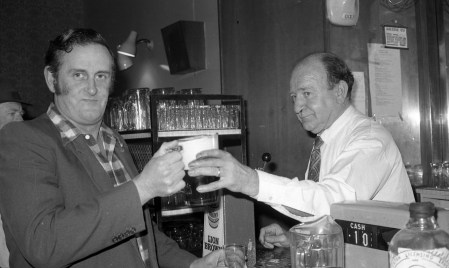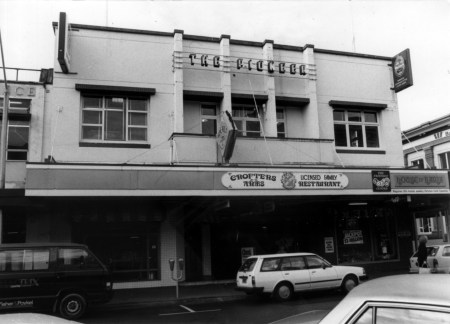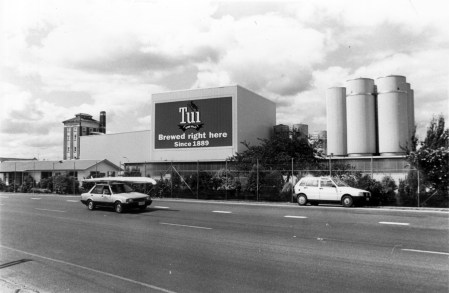
“There’s nothing so lonesome, morbid, or drear, than to stand in the bar of a pub with no beer.”
On Wednesday 1 September 1976, Slim Dusty’s nightmare scenario became a reality for a pub in Masterton, New Zealand.
At 4pm on that dreaded day, Peter Oakley (pictured above on the left) walked into the Pioneer Tavern and asked for a jug of draught. The tap spewed forth its amber liquid, then copious amounts of froth, and then nothing. The barman had to tell Mr Oakley, sadly, that the pub now had no draught beer. There was no sneer from Mr Oakley as the barman told him that he could have his jug, which was only half full, on the house.
The draught drought then extended to the flagon stock, as patrons wanting their fill of draught started to buy up the stocks of the large bottles. By the following day, the whole region had run out of flagon draught. Other pubs still had a stock of draught on tap, and the newspapers of the time were reporting that barmen were “crossing their fingers and consulting the plimsol-line in their beer tanks” hopeful they would have enough to get them through the weekend. There were only three taverns in Masterton now that had draught on tap.
Throughout the region the bar owners started to get worried. The Pioneer had already run out and the rest were not expecting to last the weekend. If a pub with no beer wasn’t nightmarish enough, Wairarapa was now facing being a region with no beer.

The whole scenario came about when brewery workers made the decision to go on strike over their pay and pretty soon the effects were being felt throughout the region. A pub in Greytown, south of Masterton, took an optimistic approach.
“We’re holding out okay for bottled beer, but we are a bit low on draught and we might get through tomorrow [Friday] night.”
Unlike when Covid struck, and shoppers fled to the supermarkets to stock up, the alcohol retailers reported there was no panic buying at that stage. The newspapers reported that the striking workers were set to return to work on Monday, and the flow of draught would soon surge back into Wairarapa. The Tui Brewery at Mangatainoka, 70 kilometres north of Masterton, was reported to have “300,000 gallons of draught beer ready to roll”.
As Saturday rolled around the pubs held their breath as their supplies dwindled. Monday was a long way away and hordes of thirsty patrons were flocking to the bars for a drink. It wasn’t helped that there was a rugby test between the All Blacks and the Springboks that weekend. The results would either be a cause for celebration or an opportunity to drown one’s sorrows.
Beer deliveries had now been suspended for a week. Tanks were empty, flagons were nowhere to be found and bottled beer was now being hit hard. The paper reinforced that the brewery workers would return to work on Monday, but then made a statement that sent chills up the spines of those that enjoyed a cold one.
It read: “Although the brewery men are expected to return to work on Monday a stoppage by engine drivers, firemen and greasers could result in another week of inactivity on the brew house floors”.
To top it off, the weekend ended badly. The All Blacks lost 16 to 10. As the papers put it: “All Blacks have no answer to rampaging Springboks”. But then came some good news. The leading article in the Monday edition of the Wairarapa Times-Age, ahead of world headlines on hijacking, strikes, plane crashes and crime, was the headline many had been looking for: “Beer supplies resume from Mangatainoka”.

The brewery workers had returned to work as they said they would, and the drivers returned as well, but they were still disputing their pay and all started work two hours late. The Tui Brewery had answered Wairarapa’s call. But the other big New Zealand breweries were not being as forthcoming as Mangatainoka. Auckland pubs were expecting to only have wine and spirits left for patrons by the end of the week.
Two weeks after the strike began, it finally came to an end. A convoy of beer tankers left from the major breweries to replenish the empty tanks of pubs around the country. At DB Brewery in Auckland, no fewer than 20 tankers made their way around the taverns in the area with their precious cargo. Now it was not just Tui beer that was available, but the other local brews too.
This was especially welcomed by one pub in Masterton. The paper put it well when it said the resuming of the beer trade would “provide great relief for patrons of Masterton’s Pioneer Bar and Lounge which was one of the first to feel the pinch as far as draught beer was concerned”.
Because there really is nothing so lonesome, morbid, or drear, than to stand in the bar of a pub with no beer – especially when there’s a footy game on the telly.
